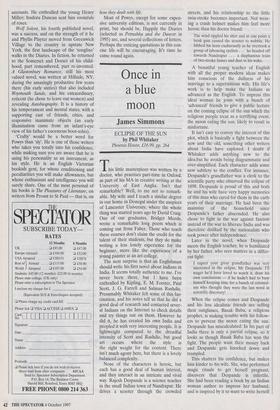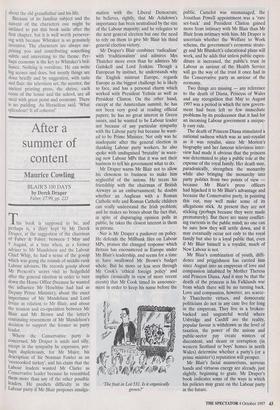Once in a blue moon
James Simmons
ECLIPSE OF THE SUN by Phil Whitaker Phoenbc House, £16.99, pp. 264 This little masterpiece was written by a doctor, who practises part-time in Oxford, as part of his MA in creative writing at the University of East Anglia. Isn't that remarkable? Well, to me not so remark- able. My wife and I teach a similar degree in our home in Donegal under the auspices of Lancaster University, where the whole thing was started years ago by David Craig. One of our graduates, Bridget Meeds, wrote a remarkable long poem which is coming out from Faber. Those who teach these courses don't claim the credit for the talent of their students, but they do make writing a less lonely experience for the beginner, more like the experience of a young painter at an art college.
The next surprise is that an Englishman should write his first novel about Indians in India. It seems totally authentic to me. I've never been there, but I have been enthralled by Kipling, E. M. Forster, Paul Scott, J. G. Farrell and Salman Rushdie. Presumably Whitaker felt some of this fas- cination, and his notes tell us that he did a good deal of research and contacted sever- al Indians on the Internet to check details and try things out on them. However he did it, he has created his own India and peopled it with very interesting people. It is lightweight compared to the dreadful intensity of Scott and Rushdie, but good art occurs where the style is the right weight for the content. There isn't much agony here, but there is a lovely balanced complexity.
None of the characters is heroic, but each has a good deal of human interest, and they interact in an intricate and vivid way. Rajesh Despande is a science teacher in the small Indian town of Nandrapur. He drives a scooter through the crowded streets, and his relationship to the little twin-stroke becomes important. Not wear- ing a crash helmet makes him feel more heroic than his doctor friend:
The wind rippled his shirt and at one point a brisk gust caused the scooter to wobble. He bibbed his horn exuberantly as he overtook a group of labouring cyclists . . . he headed off towards Nandrapur . . . a diaphanous train of two-stroke fumes and dust in his wake.
A beautiful young teacher of English with all the proper modern ideas makes him conscious of the dullness of his marriage to a superstitious wife. His life's work is to help make the Indians as advanced as the English. To impress this ideal woman he joins with a bunch of 'advanced' friends to give a public lecture on the coming eclipse of the sun which the religious people treat as a terrifying event, the moon eating the sun, likely to result in misfortune.
It isn't easy to convey the interest of this plot, which is basically a fight between the new and the old, something other writers about India have explored. I doubt if Whitaker adds anything new to the idea,but he avoids being diagrammatic and over-simplified. Each character adds some new subtlety to the conflict. For instance, Despande's grandfather was a clerk to the scientific party who observed the eclipse of 1898. Despande is proud of this and both he and his wife have very happy memories of this man who cared for them in the early years of their marriage. He had been the mainstay of the household since Despande's father absconded. He also chose to fight in the war against fascism instead of the war to liberate India and was therefore disliked by the nationalists who took power after independence.
Later in the novel, when Despande meets the English teacher, he is humiliated by her father, who sees matters in a differ- ent light: I expect your great grandfather was very interested in the eclipse, Mr Despande. I'll wager he'd have loved to watch it, draw his own conclusions — if he hadn't had to busy himself keeping time for a bunch of colonial- ists who thought they were the last word in scientific discovery!
When the eclipse comes and Despande and his less idealistic friends are selling their sunglasses, Basak Baba, a religious prophet, is making trouble with his follow- ers to prevent the moon eating the sun. Despande has miscalculated. In his part of India there is only a partial eclipse, so it looks as though Basak Baba has won the fight. The people want their money back and Despande gets knocked down and trampled.
This shatters his confidence, but makes him kinder to his wife. She, who performed magic rituals to get herself pregnant, discovers that Despande is infertile. She had been reading a book by an Indian woman author to impress her husband, and is inspired by it to want to write herself about the old grandfather and his life.
Because of its familiar subject and the naiveté of the characters one might be inclined to put this book aside after the first chapter, but it is well worth persever- ing with because Whitaker is so genuinely inventive. The characters are always sur- prising you and contributing something subtle and interesting to the theme. Per- haps economy is the key to Whitaker's bril- liance. Nothing is overdone. He can write big scenes and does, but mostly things are done briefly and by suggestion, with taste and flair: the television set, the scooter, the ancient printing press, the shrine, each room of the house and the school, are all used with great point and economy. There is no padding. As Heraclitus said, 'What splendour! It all coheres!'











































































 Previous page
Previous page